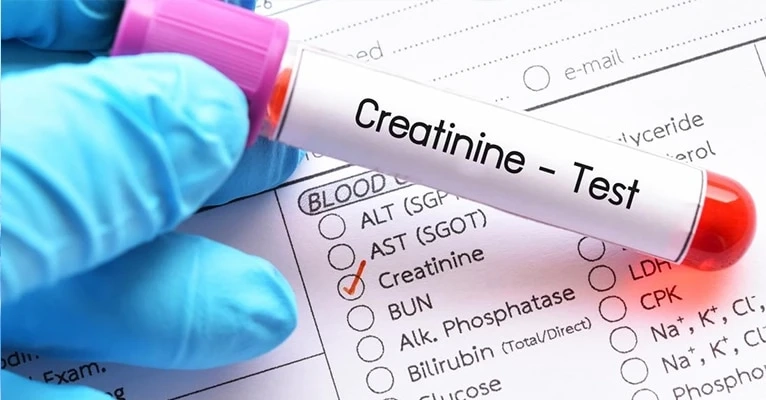What is Creatinine?
Creatinine is a byproduct of normal muscle function. Increased levels of creatinine indicate higher muscle mass in a person’s body. This is also why males have higher creatinine levels in comparison to females.
Kidneys remove the excess creatinine from the human body through the kidneys. Healthy kidneys have the capacity to filter creatinine out of the blood and dispose of it through urine.
To have higher levels of creatinine is not harmful on its own though it can also suggest other medical conditions like- chronic kidney disease. A serum creatinine blood test can help the doctors understand how well a person’s kidneys are functioning, along with other factors like the patient’s age, weight, and medical history.
What are normal and high levels?
Experts believe that normal creatinine levels may vary among different hospitals and labs across the world.
The common reference range for creatine is-
7-1.2 mg/dl for males5-1.0 mg/dl for femalesThe creatinine levels more than these levels may be considered as high. The doctor’s decision will however be taken after considering the person’s muscle mass and other factors like their age, sex, and hydration levels.
Causes of increased creatinine levels
Increased levels of creatinine are an early indication of the kidneys not functioning properly. This could be mainly because of-
Kidney stones that block the urinary tractA possible kidney infectionGlomerulonephritisKidney failureLifting heavy weights while exercising and spending extra hours doing workouts can also lead to increased creatinine levels.
Certain steroids and oral medicines that can increase muscle size end up stimulating the creatinine levels in the body and cause damage to the kidneys.
It is advised for a person before undergoing a creatinine test to let the doctor know in advance if they are on medication or on consuming a heavy protein diet.
Some of the health conditions that can also damage kidneys and increase creatinine levels in the body are-
Heart diseaseHigh blood pressureDiabetesSymptoms of increased creatinine levels
Increased creatinine levels can result in different symptoms in a person, depending on the cause.
Drug toxicity: Some antibiotics, drugs, and other medications may cause kidney damage and affect its functioning. The symptoms include:
Unstable heart rateConfusionFatiguesShortness of breathRetention of fluidChest painKidney infection: An untreated Kidney infection may result in severe kidney damage and in some extreme cases it can even lead to kidney failure. The signs and symptoms of a kidney infection are-
Nausea and vomitingBack and side painFeverFoul-smelling urinePainful and frequent urinationGlomerulonephritis: Glomerulonephritis can be caused by lupus and other infections, thus leading to kidney damage and untimely kidney failure. such a condition may cause symptoms such as-
Blood or protein in the urineSwelling of face and anklesHigh blood pressureDiabetes: People suffering from Diabetes are likely to experience high blood sugar levels, making them prone to health problems including kidney disease. Type 1 diabetes has more sudden symptoms in comparison to type 2 diabetes that happens over time. The following are the symptoms of type 1 and type 2 diabetes-
Increased thirst and appetiteFatigueNumb hands and feetBlurry visionHigh blood pressure: If the force of blood against the walls of the arteries is too high, it may indicate high blood pressure measurements. It can damage the blood vessels surrounding the kidneys and affect their normal functioning. Most people with high blood pressure do not usually develop any major symptoms.
Heart disease: The kidney’s function may get disrupted by congestive heart disease and other such conditions. The symptoms of heart disease are-
Shortness of breathChest painIrregular heartbeatFatigue and weaknessUrinary tract blockage: Urinary tract blockage is when the urinary tract gets blocked by factors like tumors, kidney stones, or an enlarged prostate. In such a condition, urine may get accumulated in the kidneys and affect their normal functioning. This may eventually lead to hydronephrosis. The following signs may indicate a urinary tract blockage -
Blood in the urineBack or side painPainful urinationFeverKidney failure: When the kidneys can no longer function on their own it suggests kidney failure. It can either be acute (with spot-on symptoms) or chronic (symptoms that develop over time).
Acute kidney failure can have symptoms such as-
ConfusionWeaknessIrregularities in urineIrregular heartbeatNausea and vomitingChronic kidney failure has the following symptoms-
Difficulty in sleepingConstant itchingMuscle crampsLack of appetiteAyurvedic Treatment for high creatinine
Ayurvedic treatment for high creatinine can naturally balance high levels of creatinine in the body. High creatinine levels are an early indication of kidney issues and may cause long-term damage to the kidneys. In such situations, dialysis or a kidney transplant becomes the only alternatives. Since both these alternatives are not affordable to everyone and can have adverse effects on health, they are usually not recommended.
Ayurvedic treatment for high creatinine thus becomes the best alternative. Ayurveda recommends adopting the following steps in order to achieve the desired results-
Lifestyle modificationsHealthy and balanced dietEnsure enough rest

